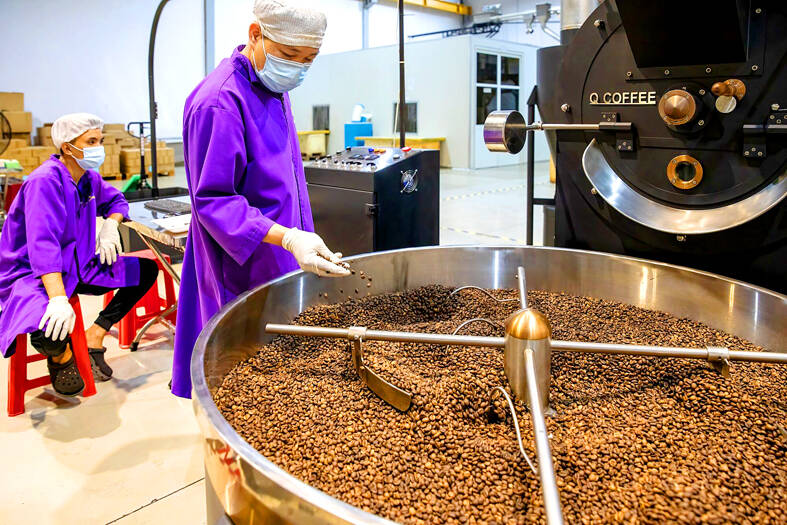Coffee cargoes are flooding Europe as traders rush to stock up on beans ahead of new environmental rules that are to be implemented at the end of the year.
The EU’s Deforestation Regulation (EUDR) require importers into the bloc to prove that commodities such as coffee, beef, cocoa and timber do not contribute to destroying forest land.
Coffee is especially vulnerable to the challenges of ensuring every bean is in compliance, so traders have raced to ship as much as they can to Europe before Dec. 30.

Photo: Bloomberg
Exports from Brazil to the bloc surged about 65 percent in the seven months to last month compared with last year, while Ugandan exports saw an all-time high last month, with the bulk headed to the continent.
“This crop is effectively the last crop we can export before EUDR comes in,” Ugandan coffee trader Ted Marley said. “The next robusta crop is in October, and given the 70-day vessel time past South Africa and the processing time, almost all coffee from the next crop will have to be EUDR compliant.”
Roasters want to cover any possible deficits for the first quarter of next year, Riccoffee managing dirctor Ricardo dos Santos said.
Few traders are willing to risk shipping beans after October and miss the window for transporting uncertified beans, dos Santos said.
This comes as traders are faced with higher prices. Robusta beans, used for instant coffee, have soared to the highest since the 1970s. Higher-quality arabica beans have surged more than 30 percent this year. Increased cost of borrowing, container shortages and longer transit periods are also adding to the challenges.
Even as traders try to ship as much as they can, the path ahead continues to be uncertain as the European Commission has not published all the implementation details, said Holger Preibisch, a chief executive for a German coffee association.
Some producing nations are also more unprepared than others.
“Uganda is really lagging behind as far as EUDR compliance is concerned,” Wakanda Coffee Brokerage Services coffee broker Joab Kankiriho said. “A great number of exporters did not have sustainability programs in place until the EUDR” became a reality.
Some EU countries and industry groups have called for the rules to be revised. For now, shipments are expected to taper off, because no one wants to be saddled with a delayed cargo that does not meet the regulatory requirements.

TECH CLUSTER: The US company’s new office is in the Shalun Smart Green Energy Science City, a new AI industry base and cybersecurity hub in southern Taiwan US chip designer Advanced Micro Devices Inc (AMD) yesterday launched an office in Tainan’s Gueiren District (歸仁), marking a significant milestone in the development of southern Taiwan’s artificial intelligence (AI) industry, the Tainan City Government said in a statement. AMD Taiwan general manager Vincent Chern (陳民皓) presided over the opening ceremony for the company’s new office at the Shalun Smart Green Energy Science City (沙崙智慧綠能科學城), a new AI industry base and cybersecurity hub in southern Taiwan. Facilities in the new office include an information processing center, and a research and development (R&D) center, the Tainan Economic Development Bureau said. The Ministry

ADVERSARIES: The new list includes 11 entities in China and one in Taiwan, which is a local branch of Chinese cloud computing firm Inspur Group The US added dozens of entities to a trade blacklist on Tuesday, the US Department of Commerce said, in part to disrupt Beijing’s artificial intelligence (AI) and advanced computing capabilities. The action affects 80 entities from countries including China, the United Arab Emirates and Iran, with the commerce department citing their “activities contrary to US national security and foreign policy.” Those added to the “entity list” are restricted from obtaining US items and technologies without government authorization. “We will not allow adversaries to exploit American technology to bolster their own militaries and threaten American lives,” US Secretary of Commerce Howard Lutnick said. The entities

Minister of Finance Chuang Tsui-yun (莊翠雲) yesterday told lawmakers that she “would not speculate,” but a “response plan” has been prepared in case Taiwan is targeted by US President Donald Trump’s reciprocal tariffs, which are to be announced on Wednesday next week. The Trump administration, including US Secretary of the Treasury Scott Bessent, has said that much of the proposed reciprocal tariffs would focus on the 15 countries that have the highest trade surpluses with the US. Bessent has referred to those countries as the “dirty 15,” but has not named them. Last year, Taiwan’s US$73.9 billion trade surplus with the US

The Taipei International Cycle Show (Taipei Cycle) yesterday opened at the Taipei Nangang Exhibition Center, with the event’s organizer expecting a steady recovery in the industry this year following a tough last year. This year, 980 companies from 35 countries are participating in the annual bicycle trade show, showcasing technological breakthroughs and market development trends of the bicycle industry at 3,600 booths, the Taiwan External Trade Development Council (TAITRA, 外貿協會) said in a statement. Under the theme “Ride the Revolution,” the exhibition has attracted more than 3,500 international buyers from 80 countries to preregister for the four-day event, which is expected to